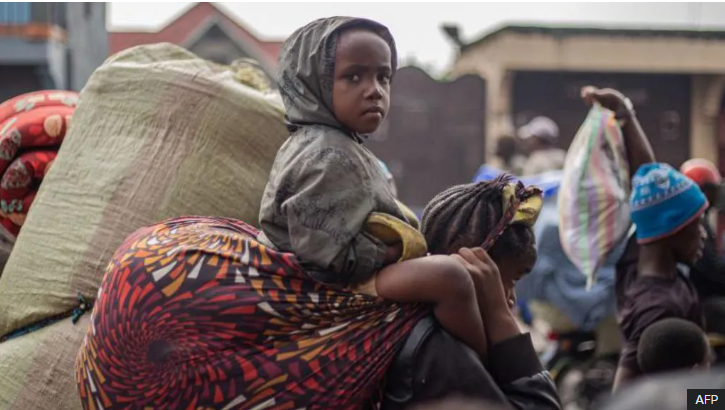
Intense fighting continues to grip Goma, a major city in eastern Democratic Republic of Congo (DR Congo), as M23 rebels and government forces exchange fire. The clashes, which began over the weekend, have forced tens of thousands of residents to flee.
“All we can hear [are] gunshots around the city,” one Goma resident told the BBC, describing being trapped at home since the fighting erupted.
Rebels Advance Amid Growing Chaos
Videos shared online show M23 rebels patrolling Goma’s main streets following their rapid advance on Sunday. While the group claims to have seized control of the city, Congolese authorities insist otherwise.
“We’re really worried,” Prosper, a journalist in Goma, told the BBC, confirming clashes between the rebels and the army in parts of the city.
According to UN-sponsored Radio Okapi, the M23 has taken control of the Goma branch of the state broadcaster RTNC. Meanwhile, terrified residents remain in hiding.
“We can hear the shooting outside our homes. We cannot leave,” Lucie, a resident, told AFP from her hiding spot.
Reports from AFP indicate that at least 17 people have been killed, and over 300 injured, in the ongoing violence.
International Implications and Accusations
The conflict escalates amid accusations from DR Congo’s foreign minister that Rwanda has effectively declared war by supporting the M23 rebels. Rwanda denies this but accuses DR Congo of backing militias aimed at destabilizing Kigali.
Kenya’s President William Ruto, chair of the East African Community, has called for a ceasefire. He announced an emergency regional summit set for Wednesday, involving the presidents of DR Congo and Rwanda, to facilitate a peaceful resolution.
Goma and Neighboring Areas Hit Hard
The violence has spilled across the border into Rwanda. A Rwandan military spokesperson confirmed five civilians were killed, and 25 injured, in the town of Gisenyi, near Goma.
The M23 group’s aggressive campaign has displaced over 400,000 people in North and South Kivu provinces since the start of 2025, according to the UN refugee agency.
Alice Feza, one of the displaced residents, lamented the repeated upheavals:
“People are fleeing everywhere, and we don’t know where to go anymore… The war catches us here among the host families, now we have nowhere to go.”
Strategic Points Under Siege
Key roads in and out of Goma are blocked, and the city’s airport is no longer operational, hampering evacuation and humanitarian efforts. Despite M23 claims of control, the government asserts it holds strategic areas, including the airport.
A government statement read:
“The FARDC [DR Congo army] hold the Goma airport… and all the strategic points of the capital of the North Kivu Province.”
Still, confusion remains. A local resident told Reuters:
“Here near the airport, we see soldiers. I have not seen the M23 yet,” adding that looting had been reported in some areas.
Humanitarian Concerns Escalate
Reports of heavy artillery, power outages, and water cuts are emerging, adding to the dire situation. The UN confirmed a mass jailbreak in Goma, where a prison holding 3,000 inmates was destroyed, leading to fatalities.
UN peacekeepers reported that some Congolese soldiers surrendered their weapons before a rebel-imposed deadline on Monday.
Calls for De-escalation
UN Secretary General António Guterres has urged Rwanda to withdraw its forces and called on the M23 to halt its advance. Thirteen UN peacekeepers have already lost their lives in the fighting.
At a UN Security Council meeting, Rwanda’s representative, Ernest Rwamucyo, criticized the international community for condemning the M23 while ignoring alleged violations by the Congolese army.
The UN has begun evacuating non-essential staff from Goma, citing the worsening conditions.
Historical Context
The M23 group, formed in 2012, claims to protect the Tutsi population in eastern DR Congo. Rwanda has previously accused DR Congo of harboring individuals linked to the 1994 Rwandan genocide, fueling long-standing tensions.
As the crisis deepens, regional and international actors are under pressure to prevent further devastation and restore stability in the region.inerals such as gold, cobalt and tantalum from eastern DR Congo.
